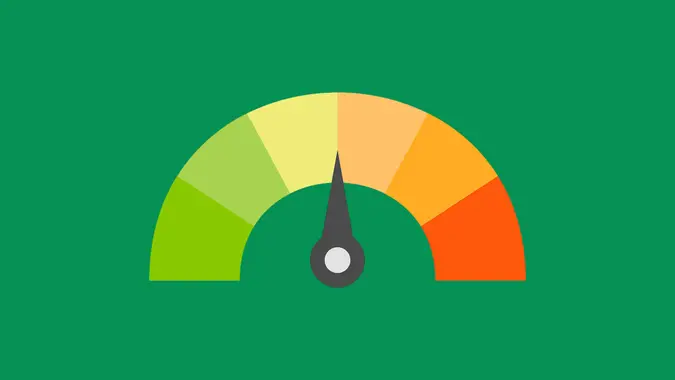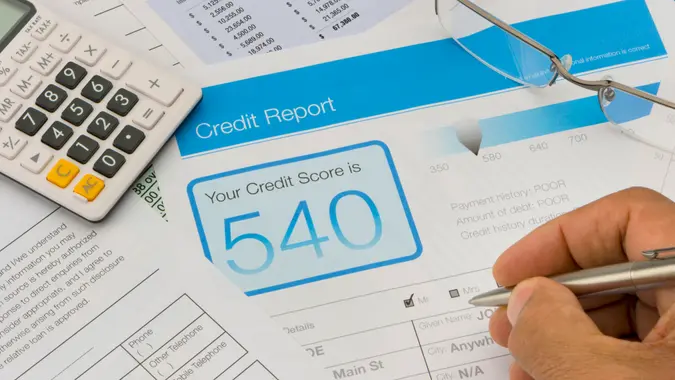Soft Inquiry vs. Hard Inquiry: What’s the Difference and Why It Matters
Commitment to Our Readers
GOBankingRates' editorial team is committed to bringing you unbiased reviews and information. We use data-driven methodologies to evaluate financial products and services - our reviews and ratings are not influenced by advertisers. You can read more about our editorial guidelines and our products and services review methodology.

20 Years
Helping You Live Richer

Reviewed
by Experts

Trusted by
Millions of Readers
Lenders run credit checks on their applicants because they can’t just take borrowers at their word that they’ll pay back the loans and credit they seek. Those checks can come as hard or soft inquiries. The biggest difference between the two is that hard inquiries can affect your credit score.
Anyone considering applying for credit or a loan must understand the differences between the two and how each can impact their credit and approval odds.
What Is a Soft Inquiry?
A soft inquiry, or soft pull, is an informal or preliminary credit review that gives an overview of your credit without impacting your score.
Common soft inquiries include:
- Checking your own credit score — you can and should check your own credit as often as you like without impacting your report or harming your score.
- Pre-approved credit card offers
- Background checks for jobs or apartments
Soft inquiries can also be a useful tool for avoiding potentially damaging rejections. For example, companies like American Express allow applicants to submit soft applications that show their approval odds before they submit to a hard credit inquiry.
What Is a Hard Inquiry?
A hard inquiry happens when a lender reviews your credit report as part of its final determination after you submit an application and consent to a hard pull.
You can expect a hard pull when you apply for:
- A credit card
- An auto loan or mortgage
- A personal loan
Hard inquiries can temporarily lower your score by a few points and future lenders can see the inquiry on your report.
Soft Inquiry vs. Hard Inquiry — Key Differences
| Features | Soft Inquiry | Hard Inquiry |
|---|---|---|
| Affects Credit Score? | No | Yes, but only modestly and temporarily, in most cases |
| Who Conducts Them? | You, employers, lenders | Lenders, but only with your consent |
| When Do They Happen? | Checking your own score, employer background checks, loan and credit card preapprovals | Applying for loans, credit cards |
| Stays on Credit Report? | No | Yes, for about a year |
How Much Does a Hard Inquiry Lower Your Credit Score?
Generally, a hard inquiry will lower your score by fewer than five points, if at all, but only for a few billing cycles, after which your score should rebound. The impact might be more significant or longer-lasting for applicants with a limited credit history or for those who submit multiple applications within a short time period.
One or two hard inquiries won’t raise red flags, but too many hard inquiries at the same time could indicate financial desperation and give lenders pause.
When Should You Expect a Hard Inquiry?
Regardless of whether a soft pull precedes a complete application, lenders will conduct a hard pull when you formally apply for:
- A new credit card
- A car loan
- A mortgage
- A personal loan
Protecting Your Credit During a Hard Inquiry
If you’re shopping for mortgages or car loans, try to keep your inquiries within a short window of roughly two weeks. Credit bureaus look at similar inquiries in a contained period as a single inquiry.
Disputing a Hard Inquiry
If you notice a hard inquiry on you report that you didn’t request, file a dispute with the credit bureau. They will conduct an investigation and can remove the inquiry from your credit report.
How to Check Your Credit Safely with a Soft Inquiry
Federal law authorizes AnnualCreditReport.com to give you one free credit report per week from the three credit reporting companies: Equifax, TransUnion and Experian.
However, you can check your credit at no cost and with no impact on your score as often as you like with free apps like:
- Credit Karma
- Experian
- Your bank’s or brokerage’s online tools
FAQ
- What’s the main difference between soft and hard inquiries?
- Hard inquiries can stay on your credit report for up to a year and might temporarily lower your score. Soft pulls do not appear on your report or affect your score.
- Do soft inquiries show up on my credit report?
- No, there is no record of soft pulls.
- How much does a hard inquiry hurt my credit?
- Typically, you won’t lose more than five points, which usually come back within a few billing cycles, unless you have limited credit or it’s one of several recent hard pulls.
- Should I avoid hard inquiries completely?
- With the exception of collateral-backed loans like margin in a brokerage account, hard pulls are part of securing loans or obtaining credit. The only way to avoid them completely is not to borrow at all, which won’t work for most mainstream consumers. However, hard inquiries should be kept to a minimum.
Our in-house research team and on-site financial experts work together to create content that’s accurate, impartial, and up to date. We fact-check every single statistic, quote and fact using trusted primary resources to make sure the information we provide is correct. You can learn more about GOBankingRates’ processes and standards in our editorial policy.
 Written by
Written by  Edited by
Edited by 






















